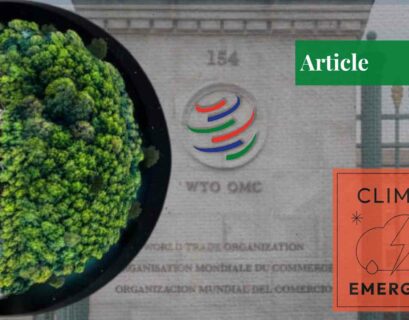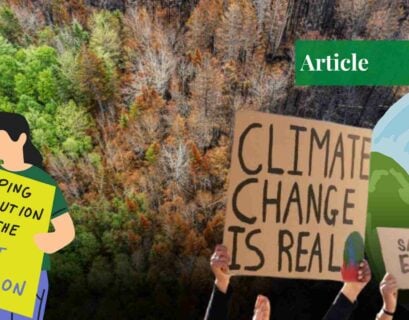Athar Ali holds a degree in international relations from Abbottabad University of Science & Technology (AUST). His area of writing includes democratic capitalism and international law. He frequently writes on the changing state dynamics in the wake of the Fifth Industrial Revolution.
Introduction
Sovereignty and the environment are critical and interconnected aspects shaping world politics. Sovereignty, as defined by Carl Schmitt, refers to the power to decide the state of exception, allowing the authority to suspend or modify laws during emergencies or crises. Meanwhile, the environment is all of the physical and natural elements surrounding living things. In the contemporary world, their relationship has significant implications that extend beyond traditional ideas of political power.
The environment plays a significant role in shaping the exercise of sovereignty. As Saskia Sassen notes, the states often find their sovereignty reconstituted and, at times, diminished in the face of environmental challenges. Environmental issues such as climate change, deforestation, and air pollution are global and require collective action from populations worldwide. To effectively handle global environmental concerns, sovereign bodies must balance expressing their power with recognizing the shared responsibility of all parties.
Brain Drain
Mass migration brought on by environmental degradation has had devastating impacts on national sovereignty. An increasing number of people have been displaced from their homes due to environmental causes such as climate change, floods, deforestation, or resource depletion, placing strain on the resources, infrastructure, and governance systems of host countries.

Crop failures brought on by shifts in weather patterns significantly contribute to food insecurity in unstable climates. As a result, there may be a strain on urban infrastructure as more people move there. The Syrian Civil War of 2011 illustrates how climate change and drought contributed to the escalation of political tensions, an outbreak of civil discontentment, and the draining of government resources, all of which threatened national sovereignty.
Rising sea levels and climate change provide significant difficulties for small island republics like Kiribati and the Marshall Islands, located in the Pacific Ocean. Sea level rise threatens to submerge several states, making them uninhabitable ultimately. Due to this existential danger, some people are leaving the state in search of higher living standards. Both the home and host states face disturbances to their sociopolitical and socioeconomic setups, which could be a potential threat to their sovereignty.
Moreover, as brain drain rises due to climate issues in some countries, the concept of sovereignty is impacted by a lack of talent pools in many nations. In the case of Puerto Rico, we can observe the effect of environmental factors in the form of brain drain. After Hurricane Maria’s 2017 destruction, the island territory of Puerto Rico in the Caribbean was already dealing with many environmental problems.
The hurricane caused the deaths of 2,975 people and $91.61 billion in damages to infrastructure. In search of a higher standard of living and more job opportunities, many people relocated to the United States. Many highly educated people, such as doctors, engineers, and educators, have left the island due to the current mass exodus. In the six months after the disaster, 135,000 Puerto Ricans migrated to the US. Indirectly, the loss of talent due to immigration threatens Puerto Rico’s sovereignty.
Toxic Environment and the Youth
Air pollution, toxic exposure, and a lack of access to safe drinking water and sanitary facilities are some environmental factors that can negatively affect youth’s health and development. Because their immune systems and other physiological processes are still maturing, children and teenagers are especially susceptible to the effects of environmental hazards. The environmental impacts on youth health can affect state sovereignty, as evidenced by the case of lead poisoning in Flint, in eastern Michigan, to which 99,000 people were exposed. After a source switch in 2014, lead began showing up in the city’s water supply.

Young people’s exposure to lead in drinking water has been linked to a variety of negative effects, including cognitive impairments and developmental delays. However, in contrast, there has been a growing awareness and concern among young people in recent years about environmental issues such as climate change and environmental degradation. It is usual for young people to spearhead movements or projects that will have a lasting impact. By raising awareness of environmental issues and influencing public opinion about how to address them through policymaking, they can impact change at the governmental level.
Economic Impact
There is potential for economic growth as a result of climate change and fossil fuel burning. For instance, energy conservation and renewable energy production may stimulate economies and put individuals to work. States and communities can take action by switching to eco-friendly farming methods, funding more resilient crop varieties, and employing more efficient irrigation systems. These changes have the potential to improve agricultural output, food security, and people’s standard of living.
Lower fertility rates brought on by climatic change can be a blessing to national independence. They allow women to focus more on their education, careers, and family planning. As a larger percentage of the population enters the working group, the state’s economy begins to improve. Lesser resources are eventually spent on childcare and poverty reduction.
In order to effectively address the interconnectedness of sovereignty and the environment, states should develop comprehensive climate nomadism policies to support displaced populations and implement climate adaptive and resilient policies to protect vulnerable island states from the catastrophic consequences of rising sea levels. States should also establish talent retention and brain gain initiatives to prevent brain drain caused by climate issues, strengthen environmental health regulations to protect youth from harm, and promote environmental activism among youth.
Additionally, implementing policies that support sustainable agriculture practices, dispense incentives for renewable energy shifts, and fulfill international climate protocols can further contribute to ensuring a more sustainable future. To address global environmental challenges, advance sustainability, and ensure the well-being of present and future generations, nations must balance their authority and shared responsibility. This calls for a reevaluation of traditional notions of political power.
However, as awareness grows about the need for collaborative efforts and mutual accountability in addressing environmental issues, an apparent shift is occurring in the relationship between sovereignty and the environment. It is possible to create a future in which power and environmental preservation can coexist peacefully by implementing sustainable practices and empowering marginalized populations, resulting in a more just and resilient world society.
If you want to submit your articles, research papers, and book reviews, please check the Submissions page.
The views and opinions expressed in this article/paper are the author’s own and do not necessarily reflect the editorial position of Paradigm Shift.



















